After the highlights, the lowlights. Sport is meant to have its drama but pro cycling often crosses the line from pantomime villainy to worse. Here’s a round-up of some of the lows.
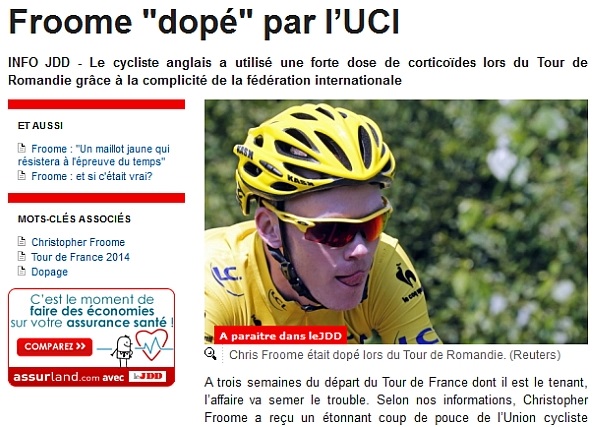
First up the leaked details of Chris Froome’s Therapeutic Use Exemption from the Tour de Romandie. It was wrong on many levels :
- the leak to the Journal du Dimanche (JDD) broke medical confidentiality. Only a few people had access to the information but TUEs and other anti-doping data from blood test data to out-of-comp testing “no-shows” are supposed to remain private
- the JDD stirred the pot further with the sensational headline “Froome ‘dopé’ par l’UCI” and it made for another dopage story in the media when other sports see their athletes abuse cortisone without concern
- there’s the ethical element that if a rider is so ill they require these powerful drugs, should they be racing too? Especially if the medicine involved can have performance-enhancing effects above and beyond the treatment for the illness
- the UCI wasn’t forthcoming on its TUE procedures either and once again was left reacting to events
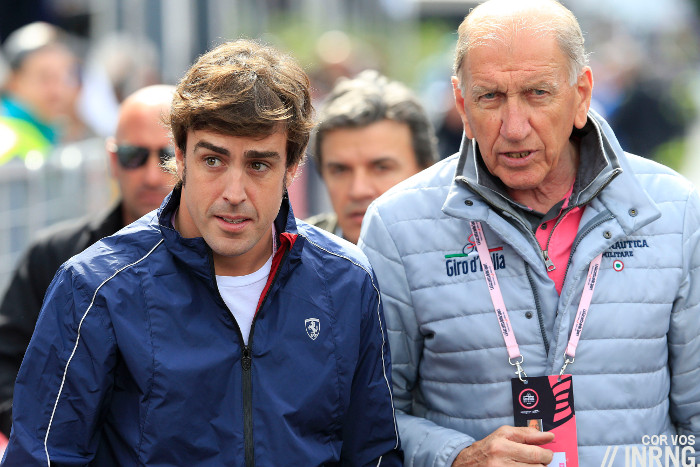
Fernando Alonso Cycling Team spells FACT but all we got was rumour. We started the year without a team and finish in the same position so there’s no loss, right? Not quite. Psychologists talk of “loss aversion” where it’s worse to get something and lose it rather than never have it in the first place. To illustrate, imagine finding a gold coin when you’re out during a ride in the middle of nowhere. Yay! You tuck it into your pocket only for it to fall out and you don’t know it until you get home. Now your wealth is the same as it was before the ride only you’re kicking yourself at the loss. Alonso’s intervention has been similar, raising hopes along the way and leaving people frustrated when nothing emerged.
It never looked very promising, hiring Paolo Bettini was a strange idea for a team promising innovation. However it’s more than story that never happened, the team’s status was enough to briefly distort the transfer market and his entourage infuriated at least two team managers with promises to merge only Alonso was only putting his name behind the team and no money nor sponsors. Too add to the confusion the project seem confused by the UCI rules, with claims the UCI’s rules on transfers prevented them from signing riders. But as Team Sky and Orica-Greenedge show, you can build a team from scratch. All you need is a wad of money to wave and the riders will come. It’s a shame there’s no team but there’s no bitterness, if the project’s been a flop we should still welcome a more coherent attempt in 2015.
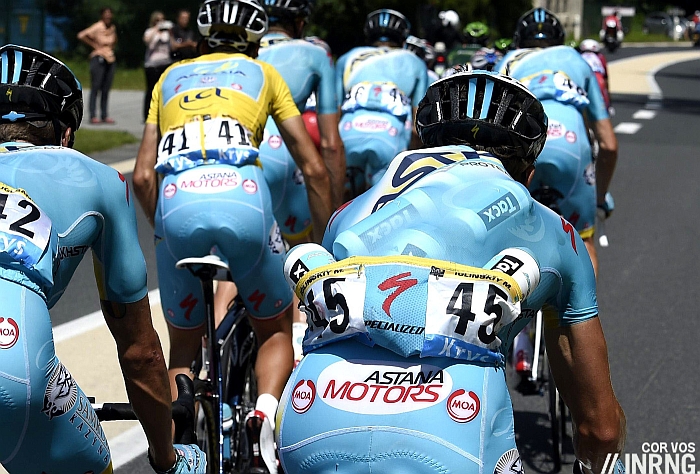
The troubles of Astana have been well-documented. Even before the Iglinskiy brothers and their matching EPO tests some were asking questions, the presence of Alexandr Vinokourov was enough to spoil the image of the team. His past certainly invites questions as does the team’s recruitment policy, for example both “Vino” and rider Michele Scarponi scored the audacious double of being clients of Michele Ferrari and Eufemiano Fuentes; while the MPCC blocked the team’s move of Ferrari client and bio-passport crook Franco Pellizotti. All this provided a tone of suspicion to undermine Vincenzo Nibali’s position in the Tour de France. Harsh? Yes but these questions are always asked during the Tour de France and it’s how riders manage the answers that matters.
Then came the treble of the Iglinskiy brothers and stagiaire Ilya Davidenok, a sorry case of three Kazakhs who should be emblematic for the team. It’s hard to judge which was worse, two riders on EPO or a young rider, still not a pro, caught. Astana’s management conspired to make matters worse when faced with a temporary suspension by the MPCC rules. We’ll never know for sure but it appeared the team engineered the timing of Maxim Iglinskiy’s confession to suit a narrow window meaning the squad could race the Tour of Almaty and Lombardia but sit out the Tour of Beijing and return for the 2015 the Tour Down Under. Gaming rules designed to protect ethics is cynical.

Was 2014 the “year of the crash”? It’s a common risk but we saw several high profile riders ejected from high profile target races during the year. There was Dan Martin’s slide in Liège-Bastogne-Liège and the repeat wipeout in the Giro’s opening team time trial. A few stages later Joaquim Rodriguez would pull out but he was still nursing race wounds from the Amstel. Come the Tour de France and Mark Cavendish left on the first day and soon after Andy Schleck left – ending his career – then we got the exit of Chris Froome and Alberto Contador robbed us of the duel which proved so tantalising in the Dauphiné. Domenico Pozzovivo broke his leg before the Vuelta.
It all might be misfortune but there was an uglier side with several post-event polemics. When Contador crashed out of the Tour de France Twitter seemed more interested in the fate of Contador’s bike than the rider or the race. In the Giro’s Montecassino maxi-crash the post-race debate wasn’t on the impressive riding by Cadel Evans or Michael Matthews but whether riders should have waited or not. If crashes are inevitable, this year it was really for the way they removed the big names. If the “empty chair” aspect was a the worst part then we can add more names, for example Marcel Kittel falling sick in the Giro or Carlos Betancur’s illness and appetite.
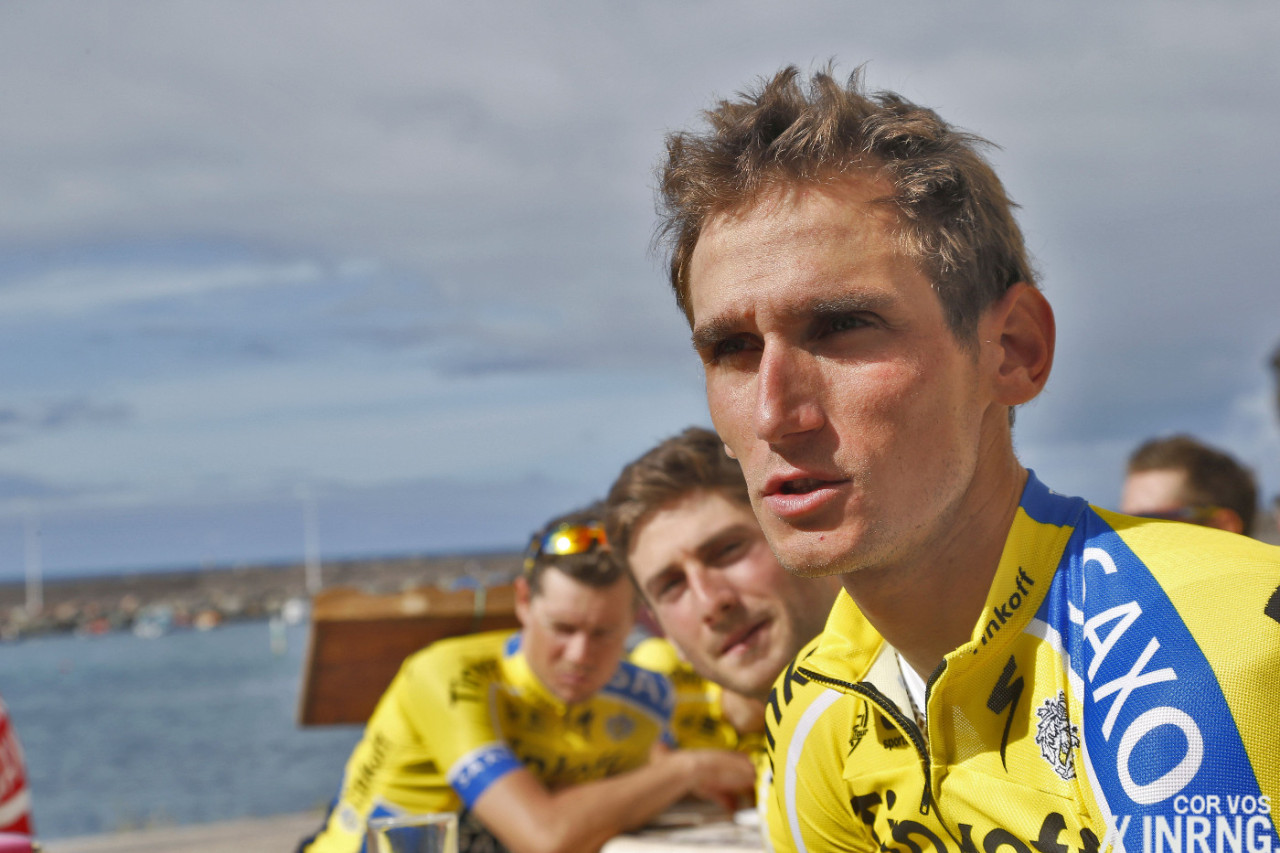
Cyclingtips have their version of the lowlights too and they list Roman Kreuziger bio passport saga as one. I can understand this and so as not to copy them, let’s enlarge the topic to inconsistency over the passport and its publicity. Kreuziger’s case is an odd one if only for his provisional suspension with the UCI leaning on his team to exclude him when it wasn’t expressly written in the rules; a similar tale with Diego “Puff Daddy” Ulissi whose asthma megadose case saw him resume racing for a day only to be stopped hours later. Kreuziger’s case might be unwelcome but at least we know about it, a great improvement over the silent case of Dennis Menchov. The Russian race robber was well into retirement before the UCI slipped a PDF onto its website to state he was banned. The sport doesn’t need to trumpet the catch but spot the difference, a retired rider is busted and the case is unknown while an active rider is only being investigated but he’s pulled from racing. It’s not as dichotomous as that, I gather Menchov put up a legal battle which prevented the case from being public but outwardly it still looks inconsistent.
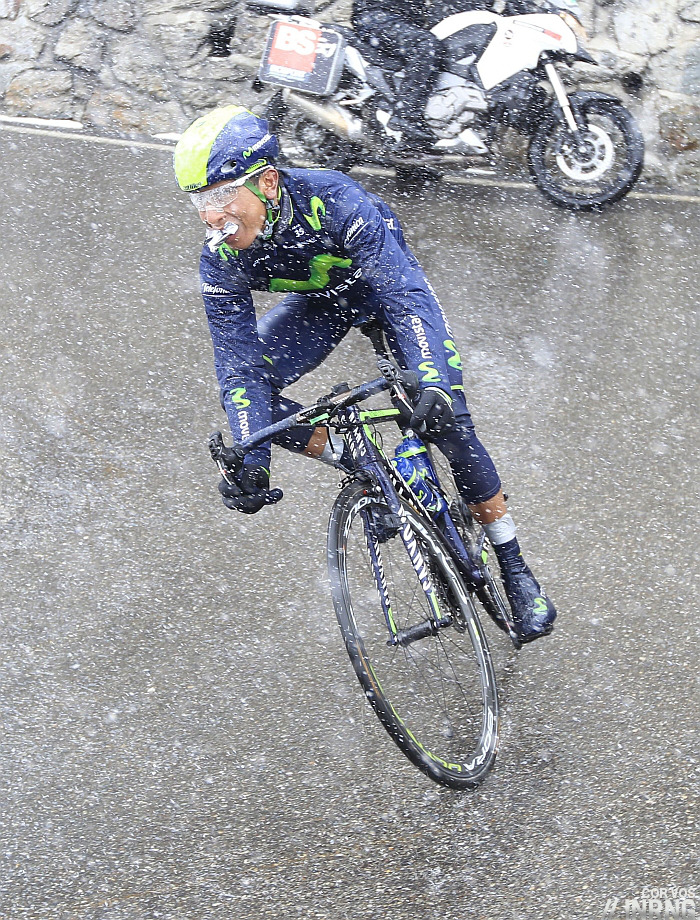
Nairo Quintana took an impressive stage win in the Giro but his move on the Stelvio was controversial. It’s hard to blame him but there were questions over red flags but all this serves to illustrate the uncertainty, it’s like the Japanese film Rashmon: there’s no accepted truth to events. What was more certain was the reaction to events. RCS were criticised for running the race in bad conditions but the weather turned bad, quickly. There’s talk about rules for racing in heat and cold but these will be difficult to draft, as discomfort and danger are a function of many variables. In the end the sorriest sight was the team managers meeting in public to discuss their response. It looked like a mafia meet or a jail yard gathering rather than professional congregation.
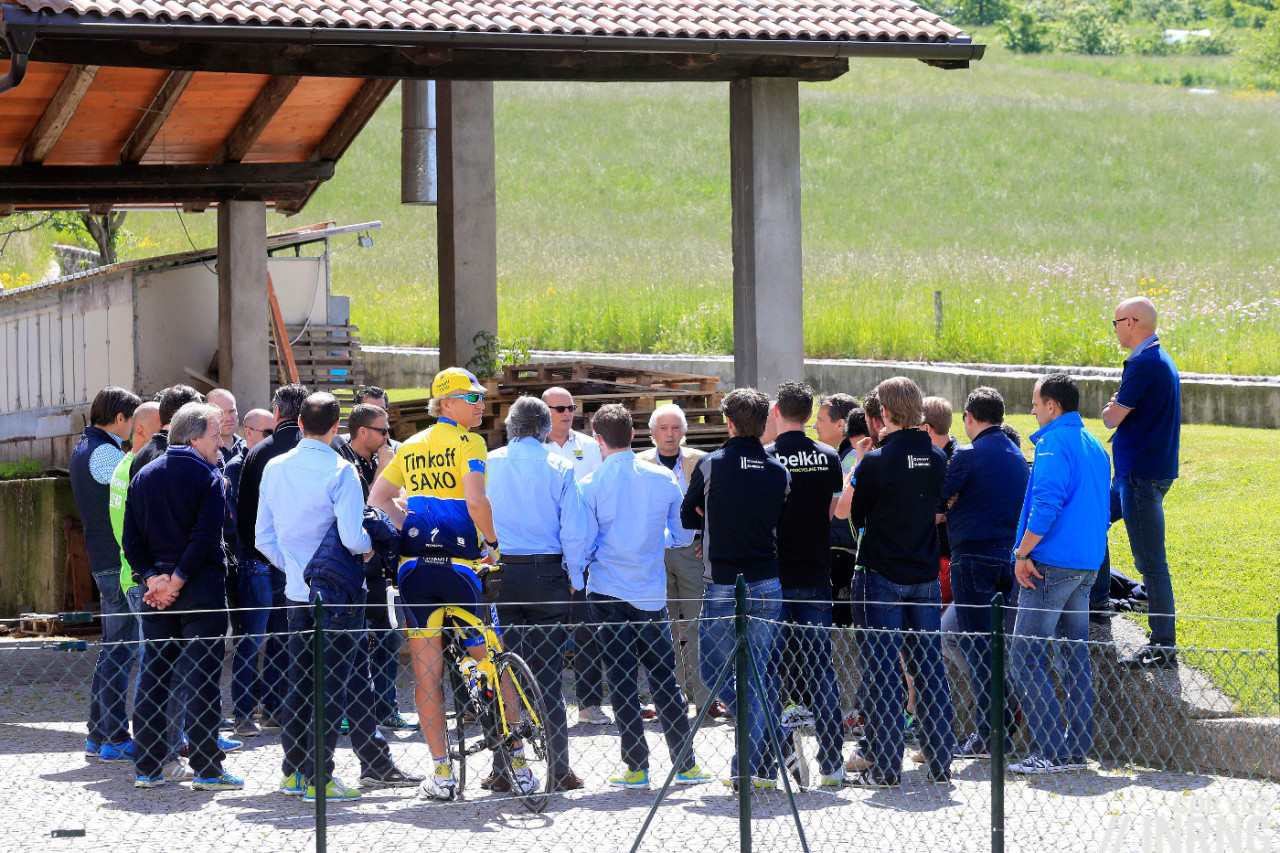
If the season is over, there’s still time to disappoint. There are two stories to watch for at the moment. First is the unpaid wages of Team Colombia. The riders are caught in a difficult situation, they’ve gone public via Twitter and the Colombian media to ask for their pay but shout too much and the UCI could deny the team a licence for 2015 meaning they’d be out of job. Colombian cycling has been resurgent and this is enjoyable to watch, if only it could attract more backing.
Second is the talk of UCI sporting reform. Some changes are needed but right now the planned changes are taking place in secret. Notionally there is input from the riders via the CPA, their union; from teams via the AIGCP grouping and, from races via the AIOCC. But the CPA often struggles for the peloton’s pulse, the AIGCP will struggle for a consensus and the AIOCC is headed by Christian Prudhomme which only gives ASO a dominant voice. Hopefully we’ll get a harmonious solution but the confidential nature of the talks suggests the parties aren’t very confident. Nobody’s explained the changes to the public nor the media – the pesky folk who stand by the road, watch TV and pay for most of it – which suggests little groundwork to build support.

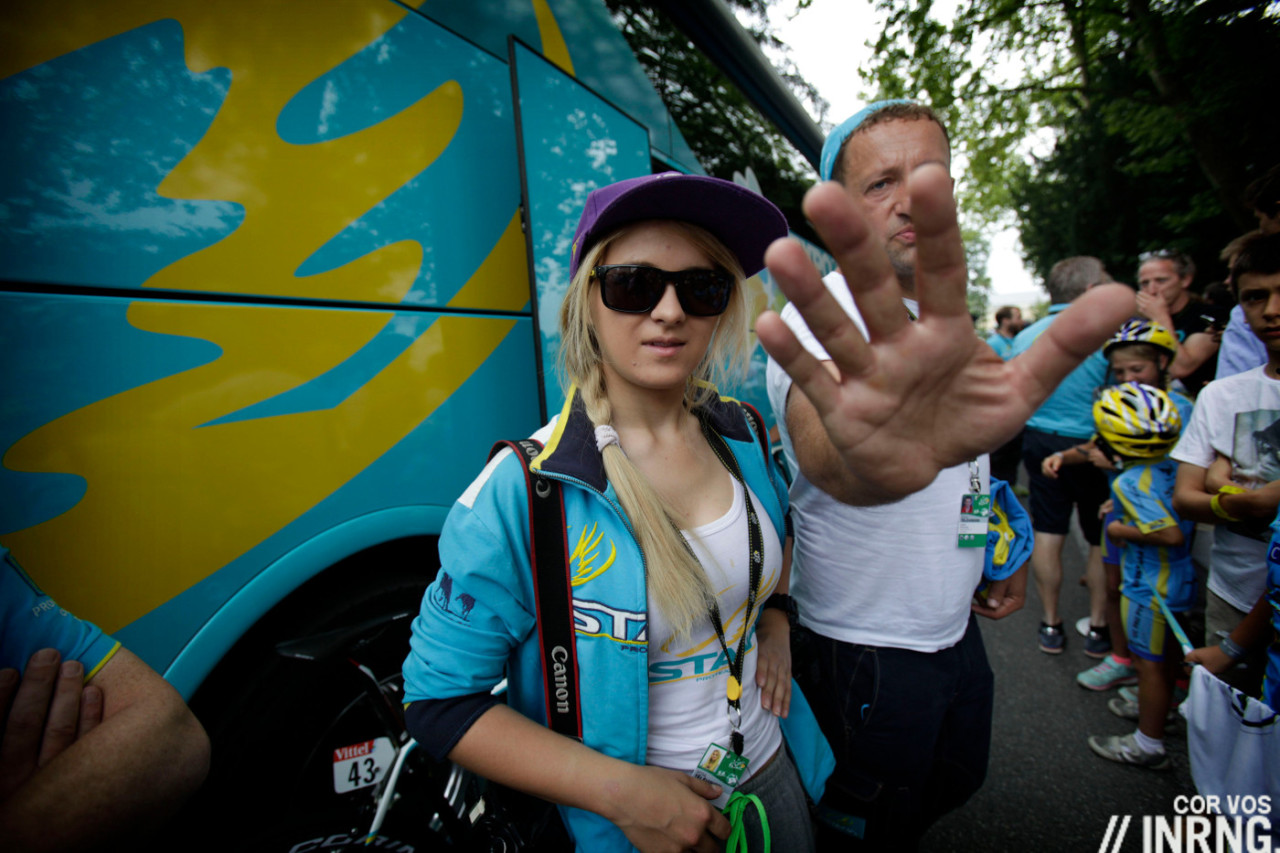
Though it doesn’t match up to this ‘Year of the crash’, the 2011 Tour had a stack of spills as well.
Wiggins, Vino, Horner, Van den Broek and Brajkovic went out. And there was the Fletcha/Hoogerland car crash – and Ten Dam’s facial smash.
Froome and Contador’s exits were notable, but there wasn’t a crash ‘scene’ that sticks in the memory – like Jenses mega crash, or Frank Schleck cobbles crash, or most of those 2011 ones do. I can still picture those moments.
Taylor Phinney
A lowlight for me is related to one of my highlights. Small beer most would say, but Astana’s putting the Italian tricolore on Nibali’s jersey the wrong way still irks me every time I see it. WHY couldn’t they put it on there the correct way? I’d lay money that the folks who make their clothing (our friends at Nalini) protested mightily about the flag being incorrect, but I guess the customer (Astana) is always right? I really wish Nibali and Co. could find an Italian backer for a team so they could kiss Vino and Co. arrivederci.
I agree it was a horrible jersey, in their defence the Italian national champions jersey has always been horizontal green/white/red stripes unlike the vertical flag. For me the problem was that the national colours were reduced in size in comparison to the sponsor’s colours, thereby disrespecting tradition.
I have no issue with traditional tricolore jerseys with the colors stacked horizontally, unlike the flag. But when you more-or-less just stick a flag image on the front of the team’s existing jersey, why the hell isn’t it like the flag instead of being turned 90 degrees? Even that thing Katusha made a few years back was better than that.
Very true. Especially galling given the fantastic job BMC and Orica did for Ivan Santaromita. You would have thought that after his TDF win the least they could give him would be a proper tricolour.
What’s this? Are we going to complain about Belgium’s and France’s champions as well? There were always horizontal.
It’s funny, the British National Champion jersey always looks like it could be Dutch to me.
For me, one of the lowlights for the year has to be team Sky. Success in the spring classics continues to elude them, a seriously pitiful effort in the Ardennes. Giro, Paris Nice, Tirreno, Dauphiné, Pais Vasco, Catalunya all eluded them. When Froome left the Tour the team bombed and hasn’t recovered since then, apart from Froome doing most of the work at the Vaelta.
It’s not been there year but neutrals might enjoy the way they haven’t been around to throttle the life out of a stage race with their mountain trains. It might have been bad luck but it was strange to see them reduced to sending below size teams to some races. What Porte does in 2015 will be interesting to see.
One smaller low was the absence of Sergio Henao and his passport, the story over his passport and the science project it inspired hasn’t come out in full yet. It’s been a “trust us” story but in cycling this is a big ask. The “Let Wiggo Ride” campaign for the Tour de France was a bit daft at times too, although if it was superficial it showed the serious problem of accommodating their star rider.
It’s been a shocker of a season for sure. The unwanted Wiggins has ironically been the one behind the headline success stories.
My guess is that Brailsford will put it largely down to bad luck (lot of sickness, injury and crashes).
If he does, he will fail to address the possible core issues and problems, and they may be in for a repeat of 2014 on the success front.
(though I have to disagree with your comment that Froome did ‘most of the work at the Vuelta’. IMO the team put in their best performance all year there.
I thought the 2014 SKYsplosion was a highlight. After Brailsford made the crack about how they might just decide to win LeTour next with a French rider, their spectacular meltdown was rather karmic I’d say. Money can’t buy everything.
I’m looking to Konig addressing some of the SKY imbalance. He is consistent. If Froome is not on form or absent, he is good enough to be a GC contender in any race.
Another one for me was the Vuelta slap-fest between Ivan Rovny and Gianluca Brambilla. Both getting chucked off the race was a low point, although this could also qualify as a highlight as the weakness of the punches thrown really made me laugh at the time.
It did make for good TV. And gave people plenty of opportunity to riff on it, things like “punchy climbers” and so on. Comedy gold.
Cookson and his CIRCus
Stelvio
Wiggins/froome
Urine on Cav
Urine on Cavendish was last year, wasn’t it?
A carryover from 2013~2014 is the folding of teams for lack of sponsors. The world economy and national economies of Spain and Italy don’t look promising for 2015, so maybe this trend will continue for a few more years?
And let’s not forget Jens-ie (Voigt) retiring from the peloton…, though he hadn’t won in some time, his optimism and positive energy will be missed!
The lack of sponsorship has nothing to do with global macro economic trends. The picture is actually quite rosy and other sports are awash in money. This is an image problem only. However, causation here or there, I agree, it is one of the low points. However, the cat is out of the bag regarding sports and corruption – specifically regarding doping – and this should help cycling by way of comparison.
What’s the picture on top with the Astana clad blonde?
Maybe a rider’s gf or something?
Well yeah! It’s a woman! Her ONLY role could be that of a gf or “something”.
she made this video
http://vimeo.com/101882114
Pretty good video for a rider’s gf or something.
Not to be picky but one typo – the movie is titled “Rashomon” not “Rashmon”.
Still the issue of fans getting involved. Nothing as bad as last year’s Cav urine incident, the tacks on the road of the 2012 TdF or the 1975 punch to Merckx’s gut, but examples like the Zoncolan idiot at this year’s Giro, or the unwitting Essex man stepping out to take a photo in front of Schleck, show it’s still an issue. And then there’s the twits with flags or costumes positioning themselves between the moto camera and the cyclists…
Don’t forget the shoulder Nibs leveled into ‘selfie girl’
The whole selfie wave was out of control in general.
Getting to see Jens Voigt race in Utah, Colorado, and break the hour was my highlight.
Seeing him retire was the biggest lowlight.
Comedy Gold was was Betancours ever expanding waist line and excuses for not racing. Topped only by the UCI handling of Roman Kreuziger. The UCI has become so inept it has become a cross between the Keystone Cops and Yes, Minister.
On the Stelvio, I fail to see what is bad about the heated polemics, the chaos, or directors left ranting. A very lowlight was indeed Liège-Bastogne-Liège, because of an all-important factor I’m surprised to see not taken into account, poor racing. Poor, controlled, meek, economized racing. And a damn bore.
You are being far too kind regarding Froome’s TUE. It was fast-tracked to the UCI’s yes-man Zorzoli who has a history of fast-tracking TUE’s for his friends. Rasmussen discussed this previously.
The unpaid wages should be a badge of shame for the UCI.
The team’s owners reportedly give the UCI enough money to pay the wages should the team fold. And now the UCI won’t pay the wages? Long ago, Floyd Landis had a similar problem before his doping controversies and was never paid his back wages. More terrible management on the UCI’s part.
“Rasmussen discussed this previously.”
Oh that paragon of truth and virtue.
Are you privy to what’s happening behind the scenes at the UCI over this, by any chance?
Perhaps a bit off-topic, Lance Armstrong’s pending legal battles are hitting the mainstream news in the US in dribs and drabs. Just when pro cycling in the US seemed to be putting the PED ( USPS) saga behind us. We still seem to have to hang our heads in shame as our sport is not taken seriously!
That lead photo is a lowlight. Who is that dopey girl dressed like an idiot? Fitting considering she’s wearing Astana gear…dopers and dopes all on one messed up team.
I think you all miss the point: although she plays a role the much more symbolic aspect of the picture is the ‘heavy’ giving the traditional ‘something to hide’ PR move: a hand to the camera.
it’s a good thing that your culture and gender are in charge of the world – your opinions matter!
I wouldn’t bother with these kind of comments in the future, Anon. It’s a lot of potential for misunderstandings and pointless flaming, for very little gain–people like Ron often don’t have the self reflection needed to realise it’s even sarcasm.
Dude, if you want to be sanctimonious about Astana, you CAN do it without these weird and creepy insults directed at a woman you don’t know and clearly have no interest in learning more about as a person.
Jaysus, how tall if Oleg? He’s a head taller than everyone else.
Isn’t that Bjarne Rijs?
No, that’s Oleg.
Great photo by the way. Perfect encapsulation of his style and big picture focus.
Low point. The continuing desire to sanitise bike racing by DSs (some ironically who accepted the doping culture) and some riders. Surely the race is against other competitors, the course and the elements. It is what has made the sport and riders what they are. To continually play the safety card for every eventuality, is going to make a tough, exciting and demanding sport no better than ‘come dancing’. You can’t descend from a 2000m mountain in a safety cocoon, cobbles in the wet are potentially lethal, sprints are inherently dangerous, large pelotons are unsafe – Well you get the picture.
Can someone please pass the message onto the self appointed safety police.
I might just add that the very same ‘safety police’, are quiet happy to drag unfortunate riders along at 80 kms/hr with their faces just inches away from the rear window of team cars.
Hypocrites’ is the only polite word that comes to mind !
“if a rider is so ill they require these powerful drugs, should they be racing too? ”
This outwardly sensible suggestion is unlikely to work. Given the choice of taking the drug and not riding or not taking the drug and riding, I guess most pros will opt to carry on riding, possibly causing themselves more harm. But the desire to compete is stronger.
The point is to deprive them of that very choice. If they need to take powerful drugs they may do so, but if they are that sick (or injured) then they are not fit to race, and may not do so. “Fit to race” means “fit to race without drugs.”
YT + BC, Pro cycling is okay with risking riders health ( TUE’s) in the name of competition. While at the same time they don’t want the riders to race in “unsafe conditions” ice, snow and cobbles at speed!
Seems incongruent.
Drugs are covered under the WADA Code. Cookson has repeatedly stated that the UCI stick with the terms of what’s permissable and what’s not under the Code, which governs the vast majority of sports.
Now you can argue whether or not you agree with that stance, but that is the stance of the governing body.
Racing conditions, on the other hand, are outside of the Code.
Therefore I don’t see the inferred incongruence in reality.
All the drugs in the world don’t help you descend, avoid bone breaking crashes,
keep you warm in the hypothermic conditions of the Classics,
keep you from getting intense saddle sores, etc.
So the low light for me is the continuing focus on cycling professional,athletes
who only do what they do is because “they take drugs “.
While at the same time the following are taking massive quantities
of PEDs and masking agents : the NFL, MLB, marathoners, cross country skiers,
soccer players, etc. You get the drift.
Staying in bed is always better for your health but these are professionals. It’s their job, they are not riding for fun. Name any other profession where the professional organization prohibits coming to work when ill. If a lawyer has a big court case and a starting bronchitis, will they stay at home or take whatever the doctor prescribed and go to work?
Reminds Me of Jonathan Vaughters bee sting in 2001
“…The anti-inflammatory he needed to cure the problem rapidly contains corticosteroids, which are banned, but can be used locally under prescription. Vaughters, who has been talking since Dunkirk of his determination to get through his third Tour, needed a general not a local injection. Doctors from the International Cycling Union are present on the race to decide cases of this kind: Vaughters was refused…”
http://news.bbc.co.uk/olmedia/1455000/images/_1456643_vaughters300.jpg
Apparently JV’s DS at CA didn’t have Zorzoli on speed dial. Does JV have Zorzoli on speed dial now?
Looks like the honeymoon’s over for Cookson. While he doesn’t seem as bad as McQuaid, the UCI still doesn’t appear to have a clue how to run the sport. For a start, just enforce the rules that are in place, consistently! Secondly, let’s join the 21 century, shall we? I’m a huge fan of racing, but let’s face it, nine tenths of every race is boring to watch on tv! Two cameras on every bike, a camera in every team car, sophisticated graphics, more stories to connect the action, are few suggestions. There’s so much more they could do to capture the excitement and beauty of the sport!
There was an interesting article on BBC sport site yesterday written by Matt Simpson(?) about the bio-passports. It was a good read: some nice quotes from the athletes involved as well as arguments about its validity.
Link: http://www.bbc.co.uk/sport/0/cycling/29959937
(Perhaps if JLT really got so plastered that he wound up not eating/drinking the day before he races for his national squad, he deserves getting fired. That might just be me.)
That article is full of problems. Read JTL’s decision. They rightfully discredit the JTL explanation.
The article conveniently ignores sports federation’s authority to open cases, or not and the writer does not have a rudimentary understanding of the anti-doping process.
I’m with channel_zero.
The likes of Matt Slater’s article (plus a couple of others that have appeared from other sources) publish JTL’s ‘argument’ with no reference to the fact that the Tribunal dismissed the defence argument of dehydration causing his blood value anomalies.
Remember, the Tribunal didnt dismiss his argument that he’d been on the lash (though funnily enough his position of ‘I didnt drink any fluids the next day’ has increasingly evolved into ‘I may have had a couple of glasses of water’). Instead they dismissed his defence argument that dehydration had caused his extreme blood anomalies.
(and yes, one worrying thing is that the BBC now seem to be treating Slater as an AD expert – they had him talk about positive test for the World no 1 badminton champ over the weekend, as an AD ‘expert)
Personally, though, I would much rather hear about the countryside than listen to some DS in a car and watch him eat a burrito.
Lowlight fo me is All claiming ” it’s cleaning up” when I heard it was cleaned (past tense) up last year. And the year before….
No sport will ever be able to guarantee that its participants are all – every single one of them – clean. That’s beyond any sport’s powers.
‘Its cleaning up’ is a statement of progress. Not a guarantee that no one is or will ever cheat.
“Diego “Puff Daddy” Ulissi”
Inspired Mr(s) INRNG. Absolute genius.
It looks like the Astana lowlight still has further to descend. Another Astana Continental rider tested positive and for the same substance as the previous rider: http://www.cyclingnews.com/news/astana-continental-rider-okishev-tests-positive-for-steroids
Four positives in less than a year for Astana. Plus the gaming of the MPCC rules. Ethical concerns anyone? Hello!
UCI! DO SOMETHING!
Serious consequences for serious offenses. You know, like the rest of the world…
I’m afraid you have a very idealised view of ‘the rest of the world’.